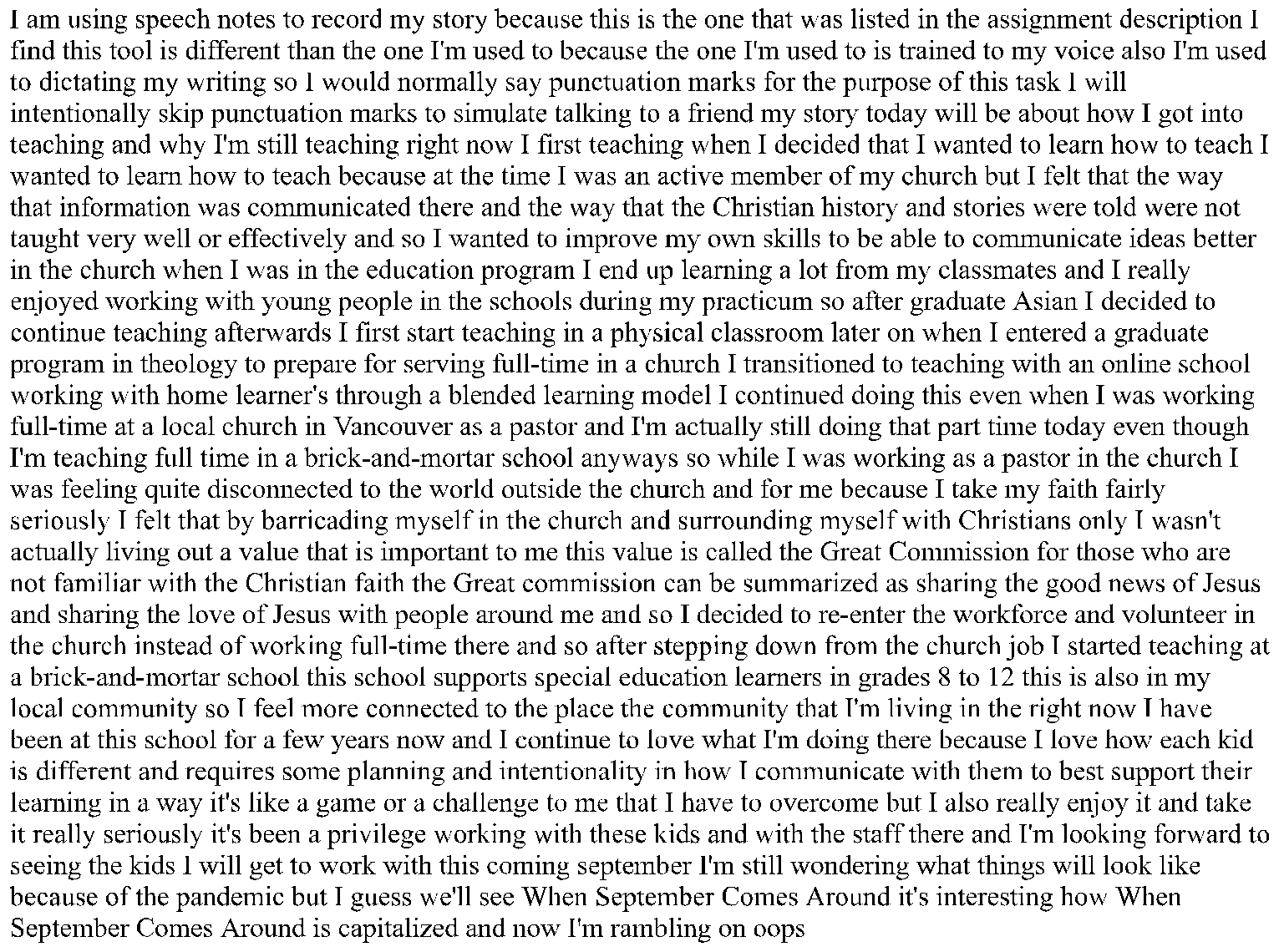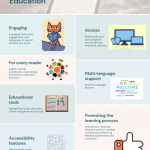
How does the text deviate from conventions of written English?
The main thing that I noticed when reviewing the text is that it lacks punctuation. Even though I pretended to be “speaking to a friend” with natural pauses, changes in the pacing, etc., these details were not recorded by the speech to text tool. The beginning of sentences is not capitalized, and some words were randomly capitalized. An example of random capitalization is found near the end of the unedited text, where the tool automatically capitalized every word of the phrase “When September Comes Around”. I assume this is either a title of a song, movie, or book that the tool tagged automatically.
What is “wrong” in the text? What is “right”?
Majority of the words I spoke showed up as the “right” words in the text. However, without pauses or punctuations, the flow of the text looks and feels “wrong”. Ideas are meshed together. When reading through, it is unclear where one idea ends, and another begins. I also noticed that some words are missing; they were perhaps not picked up by the microphone, but I am almost certain that I did “say” them. For example, “I first started teaching” was recorded as “I first teaching” with the word “started” missing. Also, one “very wrong” but funny thing can be found about 1/3 of the way into the unedited text, where the tool recorded “graduation” as “graduate Asian”. Guess that’s kind of accurate because I am Asian. And this “mistake” is probably due to my Asian accent.
What are common “mistakes” in the text and why do you consider them “mistakes”?
The common mistakes in the text were lack of capitalization for the beginning of sentences and missing all punctuations. I consider them mistakes because those are conventions in writing that normally helps me determine where an idea begins and ends. They normally enable me to track ideas in a piece of writing. Without punctuations acting as focal points for me, I find it very difficult to locate or review specific ideas hidden within the text.
What if you had “scripted” the story? What difference might that have made?
If I had scripted the story, there will be fewer “and’s” and “so’s”. I most likely would have told another story rather than the one I did. The thoughts would hopefully be more organized as well. I was basically rambling on.
In what way does oral storytelling differ from written storytelling?
Oral storytelling is a “together” experience. Oral storytelling is relational and is best while the storyteller and listeners are sharing the same “space”. When both are in the presence of each other, the storyteller can communicate ideas with more than just words; listeners can see and feel changes in body language, facial expressions, tone, volume, pacing, etc. The storyteller can adjust the story as they go depending on the reactions of the listeners. The same can happen if the listeners hear the storyteller without seeing them, but then some elements of nonverbal communication such as body language and facial expression would be missing. Oral stories can be passed down, but each retelling builds upon the previous telling and incorporates the interpretations of subsequent storytellers who retell the story. If listeners want to recount parts of the story, they have to interrupted the storyteller, or wait until the story is retold again next time.
Written storytelling does not require the storyteller and the listener or reader to be sharing the same space or time. The reader can interpret the story on their own, while a listener could rely on someone else reading the story out loud for them. Written stories can be passed on in their exact state through generations, provided that the audience remain literate and can understand the writing. Conventions in writing help structure the presentation of ideas in a consistent manner. Everything needs to be described and shown clearly using words (adjectives, adverbs, etc.). If the listener or reader wants to recall something, they can simply locate specifics by rereading parts to recount events and ideas.


Ryan Dorey
May 31, 2020 — 11:43 am
Graduating Asian. I love it. 🙂
Christopher Lam
June 1, 2020 — 3:51 pm
Right?! It gave me quite a good laugh. 🙂
emma pindera
June 1, 2020 — 4:33 am
Thanks for sharing Chris!
I did find the song title it captured – https://www.youtube.com/watch?v=l1lgzidUL8I
I am curious, if this is what it was referring to. It was a song I have never heard of before, from an artist I don’t know either.
“graduate Asian” may have just come up as a stutter or repeat, unrelated to accent. In mine I got “2020 hours of troubled” from “20 hours of travel” which is definitely due to the fact I unintentionally stuttered when saying 20.
This makes me admire the oral-storytellers skills more. Those who must have the skills to tell a story without any linguistic or structure mistakes.
Christopher Lam
June 1, 2020 — 3:54 pm
Hi Emma!
Good find! I have never heard that song before, nor have I heard of the artist. I suppose the tool is probably connected to some repository that has some “proper nouns” programmed in.
I agree with you, “graduate Asian” is most likely the result of a stutter or repeat. I had not realized how difficult it is to share unscripted stories! I normally plan for lessons when I teach, so I guess in some ways, those dialogues are scripted.
I totally agree with you that I have new found respect for oral storytellers!
Chris
heidi dyck
June 2, 2020 — 7:58 am
Hi Chris,
I really liked the way you dichotomized oral storytelling and written storytelling. I love that relationship that is found in oral storytelling and the ability of the storyteller can as you say “communicate more than just words,” – something I think gets lost quite quickly in today’s fast pace – “give it to me now” society.
Christopher Lam
June 2, 2020 — 5:45 pm
Thanks Heidi.
I totally agree with you. There’s much lost in the fast paced society right now.
Have you heard of Blinkist? Blinkist provides book summaries so “readers” can understand the key insights from some of the most popular, highly rated non-fiction books. These summaries are designed to be read in 15 minutes or less through their app. It’s supposedly marketed towards “busy”, “successful” people who don’t have a lot of time…In my opinion, SOOOO much is lost by something like this!
Much like coaching and mentoring, the relationships and interactions are so valuable! I think that’s the element of oral storytelling that makes it SOOOO amazing!
There is something I am wrestling with though. Like what Alexander (the tap dancer) shared in his TED talk, I think technology has the potential of preserving stories. Using videos, whether through livestreaming or leaving it on platforms like YouTube or Vimeo, oral stories can be told and then shared infinite times while preserving all the nonverbals from the “original” storyteller, or preserving some “best versions” of a story. On the other hand, what’s special about oral storytelling is how the story changes with each re-telling. So would technology make oral stories “better”, or make it “worse” by limiting changes?
heidi dyck
June 3, 2020 — 12:35 pm
You make some very interesting points and connections. The use of technology, in terms of videos, would definitely allow a more authentic version to be preserved; but I think, like Alexander said in the video, the anticipation of waiting to go to the store to rent everything to watch the movie for him was a large part of the experience, not just watching the dancers. The same would be for oral storytelling, with it being preserved and readily available the value of the story would decrease knowing you could just search it up at any time. The nostalgia, or the experience of sitting with the elder, or the storyteller is a silent part of the story – and no matter how we preserve those stories that piece will always be missing.
Christopher Lam
June 3, 2020 — 10:34 pm
I totally agree that no matter how we preserve those stories, some pieces might always be missing.
I wonder though, could advancements in technology, such as VR and AI, change that? Some time in the future, I wonder if an advanced AI-assisted VR experiences could allow someone to be in the “virtual” presence of the original storyteller, similar to interactions with NPC’s in video games? With enough “versions” and “retellings” of the same story recorded, as well as data collected from each interaction and dialogue, I wonder if AI technology can be used to generate a somewhat authentic experience by adjusting the story as a response to nonverbal cues from listeners.